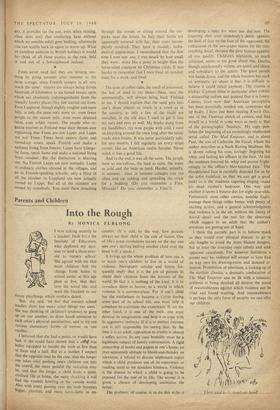Parents and Children
Into the Rough
By MONICA FURLONG
'But,' she said, 'we feel that nursery school teaches them too many cruel things too soon.' She was thinking of children's tendency to gang up on one another, to draw harsh attention to each other's physical peculiarities, and to try out various elementary forms of torture on one another.
I believed that she had a point, or would have had, if she could have shown that a cltf was better equipped to handle the mob at five than at three and a half. But as a mother I suspect that the opposite may be the case; that the longer one takes over pushing one's children out into the crowd, the more painful the initiation may be, and that the longer a child leads a quiet, civilised life at home, the more shocking it will find the vandals howling in the outside world. Also with every passing year the mob becomes bigger, cleverer, and more formidable to en- counter. (It is odd, by the way, how parents always see their child it the role of victim. One of life's great revelations occurs on the day one sees one's darling batting another child over the head with a spade.) It brings up the whole problem of how one is to teach one's children to live in a world of violence. Newspaper articles and letters fre- quently imply that it is the job of parents to shield their children from the horrors of the world. In fact it is nothing of the kind. It is to introduce them to horror, to a world in which violence is a commonplace. For if one's child has the misfortune to become a v:ctim during some part of its school life, one must help it somehow to assimilate the experience. If, on the other hand, it is one of the mob, one must develop its imagination, and help it to cope with its aggressive instincts. If it is at neither extreme one is still responsible for seeing that, by the time it is an adult, opposition to cruelty is almost a reflex action. In any case brutality must be a legitimate subject of family conversation. A rigid censorship of books and papers in one's home, an over-squeamish attitude to blood-and-thunder on television, a refusal to discuss unpleasant topics which a child produces out of its experience or reading, seem to me mistaken kindness. Violence is the disease to which a child is going to be exposed for the rest of its life. The sooner it is given a chance of developing antibodies the better.
The problem, of course, is to do this wilhc• It developing a taste for what one dep'bres. The lingering shot over somebody's death agonies, the look of fear on the face of the oppressed, the enthusiasm of the newspaper report for the tiny, revolting detail, sharpen the dirty human appetite all too quickly. Children's television, so much criticised, seems to me good about this. Deaths, though unashamedly violent, are quick and clean, and subsidiary to the action. The .good people win hands down, and the whole business has such an antiseptic air about it that it is .difficult to believe it could infect anybody The cinema is trickier. Cartoon films in particular often exhibit a nauseating sadism and pretend that it is.funny.. Comics, even now that American necrophilia has been mercifully weeded out, sometimes slip up badly. I have just been reading Knock Out, one of the Fleetway clutch of comics, and find myself in a world in some ways as nasty as that of the pornographic 'Sundays.' My copy pub- lishes the beginning of an exceedingly unpleasant serial called The Mad Emperor•, and is about Paul, the son of'Catherine the Great, whom the author describes as a Stark Raving Madman. He is shown rolling his eyes, lovingly fingering his whip, and lashing his officers in the face. 'At last the madman lowered hi: whip and peered fright- eningly in the officer's bloodstained face.' The bloodstained face is carefully depicted for us by the artist (sideface, so that we can get a good look) as is the madman capering singing round his dead mother's bedroom. One way and another it seems a bizarre diet for eight-year-olds. Fortunately most other comics, notably Eagle, manage these things rather better, with plenty of exciting action, and a general acknowledgment that violence is in the air, without the listing of horrid detail and the zest for the abnormal which suggest to an adult that the author's emotions are getting out of hand.
1 think the parents' part is to behave much as they would over physical disease; to go to any lengths to avoid the more blatant dangers. but to treat the everyday ones calmly and with apparent casualness. For however fastidious a parent may be, violence will sooner or later find its way into his drawing-room and demand at tention. Prohibition of television, a locking-up of the earthier classics, a dramatic confiscation of The Mad Emperor and its ilk with a laboured pretence at being shocked all destroy the mood of reasonableness against which violence can be tried and found wanting. And reasonableness is perhaps the only form of security we can offer our children.
'llierc List,/ to b: hundreds herd'


































 Previous page
Previous page